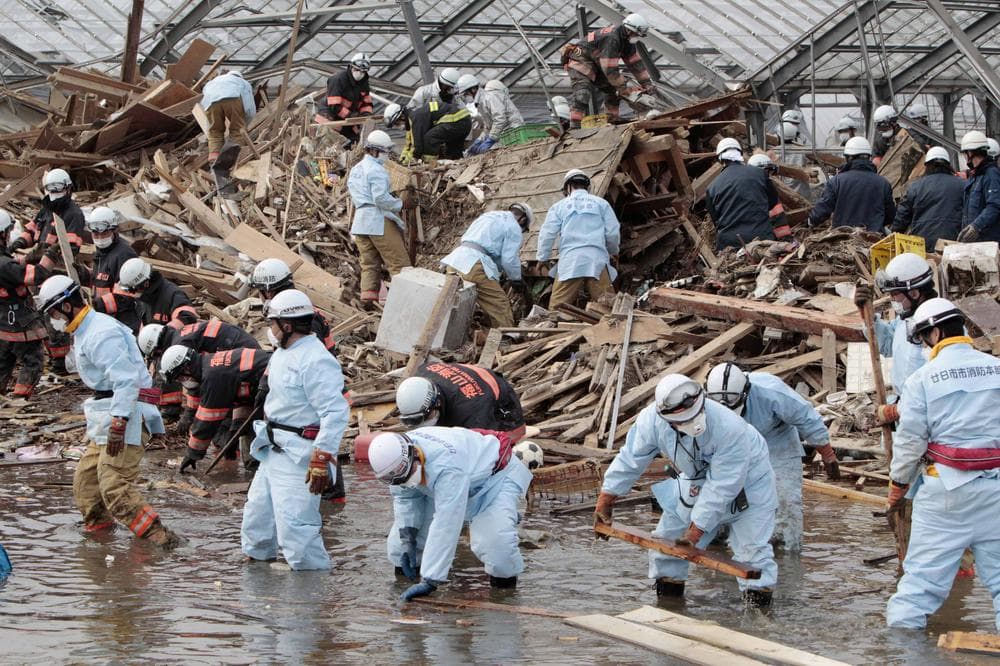Advertisement
Japan Backs Off Venting Of Leaking Japan Reactor

The operator of Japan's overheating, leaking nuclear plant backed off a tricky venting of radioactive gas from a troubled reactor Sunday as concerns grew about wider contamination of food and water.
Traces of radiation are turning up well beyond the leaking Fukushima Dai-ichi plant after cooling systems to its six reactors were knocked out by the massive March 11 quake and tsunami on Japan's northeast coast. Radiation has seeped into the food supply, with spinach and milk from as far as 75 miles (120 kilometers) showing levels of iodine in excess of safety limits, although officials said they posed no immediate health hazard.
Minuscule amounts are being found in tap water in Tokyo and rainfall and dust over a wider area. Taiwan even reported receiving a batch of contaminated fava beans imported from Japan.
"I'm worried, really worried," said Mayumi Mizutani, a 58-year-old Tokyo resident shopping for bottled water at a neighborhood supermarket out of concern for her visiting 2-year-old grandchild. "We're afraid because it's possible our grandchild could get cancer," she said.
After the cascading troubles at the Fukushima plant appeared to lessen Saturday, pressure inside the vessel holding the reactor of Unit 3 rose again Sunday, dealing a setback to the government and forcing officials to consider the dangerous venting. Nuclear safety officials said one of the options could release a cloud dense with iodine as well as the radioactive elements krypton and xenon.
The plant's operator, Tokyo Electric Power Co., temporarily suspended the plans Sunday after the pressure inside the reactor stopped climbing, though it was at a relatively high level.
"It has stabilized," Tokyo Electric manager Hikaru Kuroda told reporters. Kuroda said temperatures inside the reactor reached 572 Fahrenheit (300 degrees Centrigrade) and the option to release the highly radioactive gas inside - a maneuver he called a "dry vent" - is still under consideration if pressure rises.
The higher reactor pressure may have been caused by a tactic meant to reduce temperatures - the pumping of seawater into the vessel, Kuroda said.
Using seawater to douse Unit 3 and the plant's five other reactor vessels or their nuclear fuel storage pools was a desperate measure since it's corrosive, damaging the finely milled machine parts. The government acknowledged Sunday that the entire complex would be scrapped once the emergency is resolved.
"It is obviously clear that Fukushima Dai-ichi in no way will be in a condition to be restarted," Chief Cabinet Secretary Yukio Edano told reporters.
Growing concerns about radiation add to the overwhelming chain of disasters Japan has struggled with since the 9.0-magnitude quake. The quake spawned a tsunami that ravaged the northeastern coast, killing more than 8,100 people, leaving 12,000 people missing, and displacing another 452,000, who are living in shelters.
Fuel, food and water remain scarce for a 10th day in the disaster. The government in recent days acknowledged being caught ill-prepared by an enormous disaster that the prime minister has called the worst crisis since World War II.
Before the disasters, safety drills were seldom if ever practiced and information about radiation exposure rarely given in Futuba, a small town in the shadow of the nuclear plant, according to 29-year-old Tsugumi Hasegawa. In the aftermath, she is living in a shelter with her 4-year-old daughter and feeling bewildered.
"I still have no idea what the numbers they are giving about radiation levels mean. It's all so confusing. And I wonder if they aren't playing down the dangers to keep us from panicking. I don't know who to trust," said Hasegawa, crammed with 1,400 people into a gymnasium on the outskirts of Fukushima city, 80 miles (50 miles) away.
Another nuclear safety official acknowledged Sunday that the government only belatedly realized the need to give potassium iodide to those living within 12 miles (20 kilometers) of the nuclear complex.
The pills help reduce the chances of thyroid cancer, one of the diseases that may develop from radiation exposure. The official, Kazuma Yokota, said the explosion that occurred while venting the plant's Unit 3 reactor last Sunday should have triggered the distribution. But the order only came three days later.
"We should have made this decision and announced it sooner," Yokota told reporters at the emergency command center in the city of Fukushima. "It is true that we had not foreseen a disaster of these proportions. We had not practiced or trained for something this bad. We must admit that we were not fully prepared."
Contamination of food and water compounds the government's difficulties, heightening the broader public's sense of dread about safety. Consumers in markets snapped up bottled water, shunned spinach from Ibaraki - the prefecture where the tainted spinach was found - and overall express concern about food safety.
Experts have said the amounts of iodine detected in milk, spinach and water pose no discernible risks to public health unless consumed in enormous quantities over a long period of time. Edano, the government spokesman, tried to reassure the public for a second day running Sunday.
"If you eat it once, or twice or even for several days, it's not just that it's not an immediate threat to health, it's that even in the future it is not a risk," Edano said. "Experts say there is no threat to human health."
No contamination has been reported in Japan's main food export - seafood - worth about $3.3 billion a year, less than 0.5 percent of its total exports. But the island of Taiwan, just to the south and a huge market for Japanese goods, said Sunday that radiation had been detected in a batch of Japanese fava beans but at levels too small to harm human health.
This program aired on March 20, 2011. The audio for this program is not available.